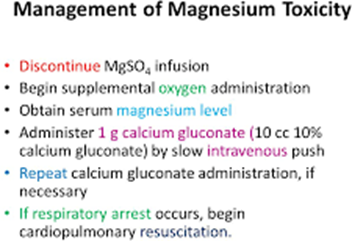A woman with severe preeclampsia has been receiving magnesium sulfate by intravenous infusion for 8 hours. The nurse assesses the woman and documents the following findings: temperature of 98.1F, pulse rate of 96 beats/min, respiratory rate of 10 breaths/min, blood pressure (BP) of 135/90 mm Hg, 1+ deep tendon reflexes, and not ankle clonus. The nurse calls the physician, anticipating an order for:
Select one:
Diazepam.
Hydralazine orally twice a day.
Calcium Gluconate
Second bolus of Magnesium sulfate.
The Correct Answer is C
a. Diazepam is not indicated for the treatment of severe preeclampsia.
b. Hydralazine orally twice a day is not indicated for the treatment of severe preeclampsia.
c. Calcium Gluconate is indicated for the treatment of hypermagnesemia, which can occur as a result of magnesium sulfate infusion.
d. This will worsen the magnesium toxicity.

Nursing Test Bank
Naxlex Comprehensive Predictor Exams
Related Questions
Correct Answer is A
Explanation
a. Certain anticonvulsants, such as phenytoin and carbamazepine, can decrease the effectiveness of COCs.
b. Antihypertensives do not typically interfere with the effectiveness of COCs.
c. Antioxidants do not typically interfere with the effectiveness of COCs.
d. Antiemetics do not typically interfere with the effectiveness of COCs.
Correct Answer is A
Explanation
a. Anasarca, which refers to generalized edema or swelling, can be a sign of a serious medical condition such as preeclampsia or heart failure and should prompt immediate medical evaluation.
b. Morning vomiting is a common discomfort in the first trimester of pregnancy and typically does not require immediate medical attention unless it is severe or persistent.
c. Braxton Hicks contractions, which are mild and irregular contractions that can occur throughout pregnancy, are typically not a cause for concern.
d. Frequent urination is a common discomfort in the first trimester of pregnancy and typically does not require immediate medical attention unless it is accompanied by other symptoms.
Whether you are a student looking to ace your exams or a practicing nurse seeking to enhance your expertise , our nursing education contents will empower you with the confidence and competence to make a difference in the lives of patients and become a respected leader in the healthcare field.
Visit Naxlex, invest in your future and unlock endless possibilities with our unparalleled nursing education contents today
Report Wrong Answer on the Current Question
Do you disagree with the answer? If yes, what is your expected answer? Explain.
Kindly be descriptive with the issue you are facing.
